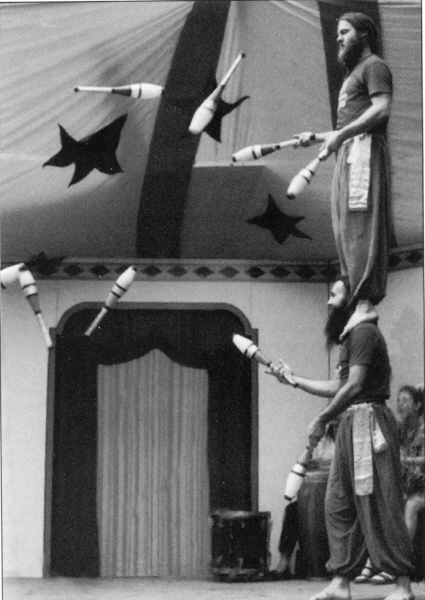As
interesting as the show itself is their basic philosophy of juggling.
For the Mud Bays, juggling is a vehicle for creative expression and
communication with
an audience, not an end in itself. "We try to come up with a
story line that develops through the juggling," explained
Martin. 'We don't follow
the common 'sensationalist' approach
to juggling."
|
Fitzhum
continued, "In a sensationalist juggling style, the
build-up is all-important. You're telling the crowd
when to be impressed, when to clap. You're telling the
crowd to tell you how wonderful you are. You're juggling for
the sake of juggling. Juggling becomes an inwardly focused
activity. For us, juggling isn't a buildup, it's a process.
We focus our energies and attention outward, toward the
audience. We make lots of eye contact
with the audience, for example. So juggling becomes an
act of communication, of communicating emotions. We're trying
to reach out to an audience and share something magical,
something of ourselves." For example, there's a
five-minute routine called "Bembe," after the rhythm
the percussionists use for it, which exemplifies their novel
style. Since it involves five clubs and three people, the
routine typifies the different direction the Mud Bays take.
|
|
Bembe
is a study of creative movement. Fitzthum stands in
the middle, and slowly does a basic, mindless, three
club cascade. Jensen creeps up on one side, Martin on
the other, each grasping
one club. Then Jensen, standing
to Fitzthum's right, steals and replaces
one of Fltzthum's left hand
tosses. Three beats later, Martin does the
same thing on Fitzthum's opposite side.
Jensen and Martin each now repeat
this steal and replace every six beats. Between successive
steals, Jensen and Martin have six beats
to play to the audience. In each of the six beat
cycles, Martin and Jensen act out different playful
and inventive antics - one time they might
walk around like mechanical automata, another
time like a dazed zombie, and sometimes
they just jump toward the audience make a
wild-eyed face, and freeze for four beats. They also
dance, prance and swing their club around in
silly ways. Each time around they do something
different, while Fitzthum minds his own business,
gently juggling his three club cascade.
At
one point, Martin moves his club slowly across
the front of Fitzthum's face.
Fitzthum, as if distracted,
turns his head to follow it. Later in the routine,
the pace of steals quickens - Jensen steals every
left hand toss, and Martin steals every
right hand toss. Then Fitzthum, as if taking a
big breath before going underwater, dramatically
shuts his eyes
tight, while continuing the same mindless three club
cascade. Of course he doesn't need his eyes, because Jensen
and Martin intercept every one of his tosses, and hand-place
every one of his "catches" back into his hands.
Even
though from a purely "technical juggling" point of
view, Bembe is fairly simpleminded, they claim it's one of
their hardest routines. The difficulty arises from fitting
the steals flawlessly into Fitzthum's juggling tempo
(accentuated by
the percussionists rhythms) while making them fluidly
merge with the evervarying dance and theatrical
characterizations that fill the intervals between them.
From
the audience's perspective, this routine is perhaps one of
the most effective. Despite the seeming simplicity of the
juggling, so much happens theatrically that the audience is
mesmerized by
the beauty and creativity of the movements, and
captivated by
the theatrical personas.
Gorski
commented, 'Watching three people juggling five clubs,
rather than one person juggling five clubs, is a good
example of
the combination of
three human emotions dominating space typically
occupied by juggling clubs alone.
|
|
The
drive for greater expressive possibilities has led the Mud
Bays to all but renounce street performance (which they say
forces them into "sensationalism") and devote their
energies exclusively to theatres, where they can control more
directly the stage effects of lighting, props and music. (The
Oregon Country Fair remains an exception.) "In a stage
show, we can command the audience's attention more fully and
develop more nuanced characterizations'" explained
Jensen. In other words, more communicative potential.
Their
new show, which opened at the Capitol Theatre in Olympia last
August and ran for a week at the Edmonton Fringe Festival,
illustrates this theatrical direction.
|
|
Did
you ever wake up from a dream so beautiful that you had to
share it with someone?" Martin asked. "That's what
this show's about. We're trying to create a fantasy world,
something that, unless you saw it in the real world, you'd
expect to see only in a dream. The show was inspired by the
times they remember driving back home together in their van
late at night, exhausted and drowsy after a show, hashing out
new ideas. Entitled "Nodding Off," various juggling
routines are framed by a central theme of a janitor (Fitzthum)
and stage manager (Martin) cleaning and setting up the stage
of a concert hall the night before a recital of a great
concert pianist (Jensen). Despite the stage manager's
cajoling, the janitor keeps "nodding off," and
dreaming of (what else?) wonderful juggling routines.
What's
next for the Mud Bays? Since each of the group's members is
steadily occupied with extra-juggling pursuits, long range
planning is difficult. "Given our various interests,
careers and family lives, we will probably continue to take
things a year or two at a time," said Jensen. 'We try to
take into account everyone's interests (and availability)
when planning for the future. Several of us would like to tour
Europe someday. Others think more in terms of weekend runs
in various Pacific Northwest cities."
In
any case, all of the Mud Bay Jugglers plan to perform together
indefinitely. The Mud Bay's style, the joy they find in
performing, and their commitment to developing original
material make them one of the most unique and entertaining
juggling troupes performing today.
Peter
Mark lives and juggles in Eugene, Oregon, where he's finishing
a Ph.D. in theoretical computer science.
|
|

